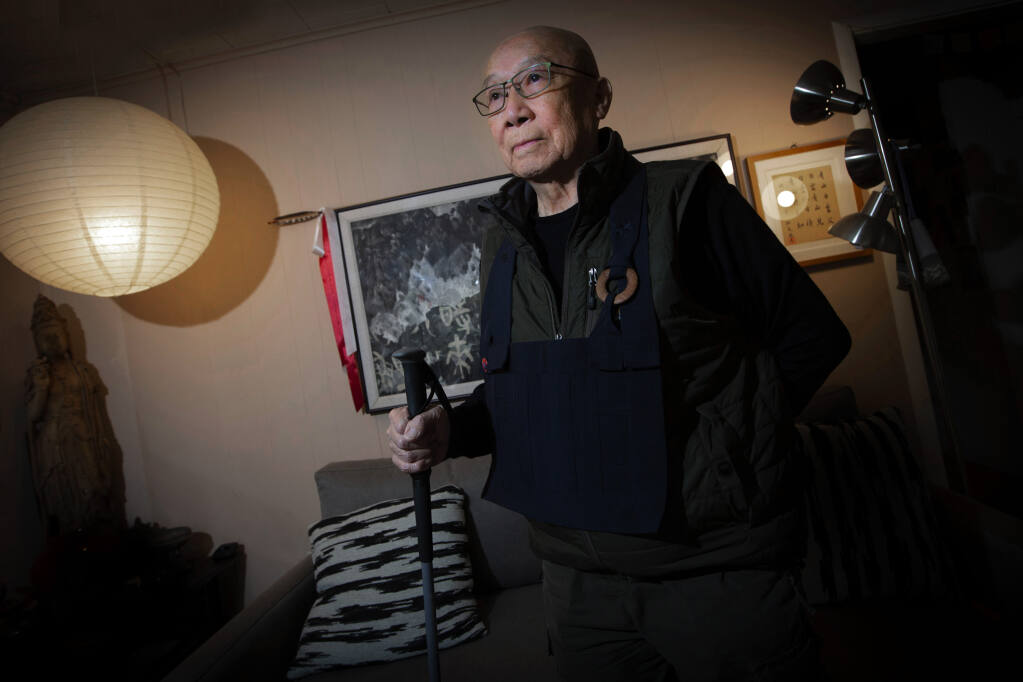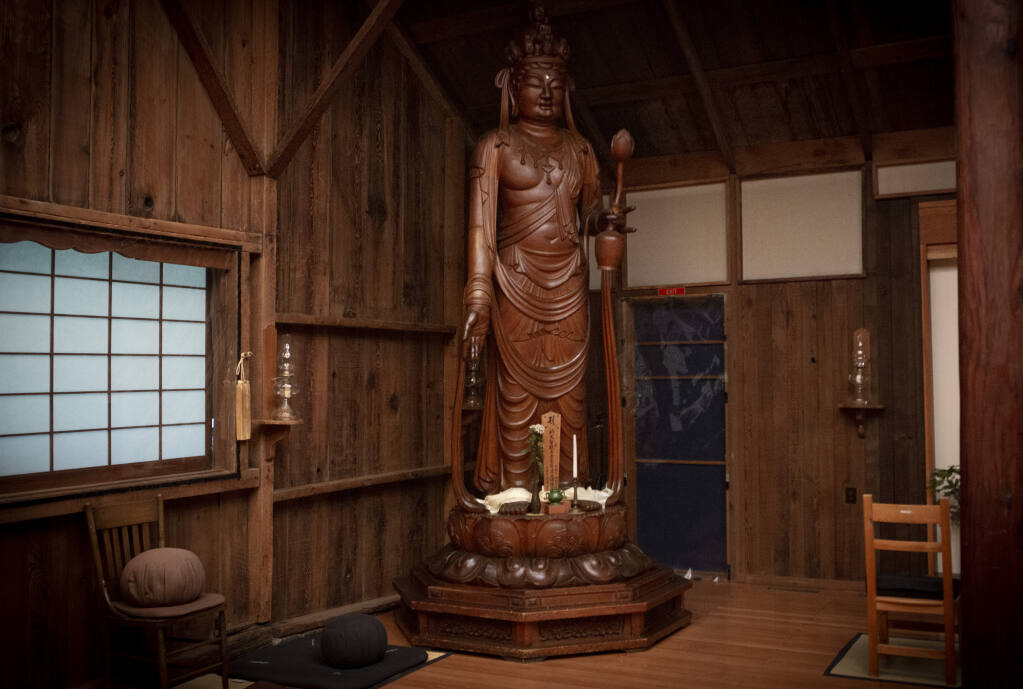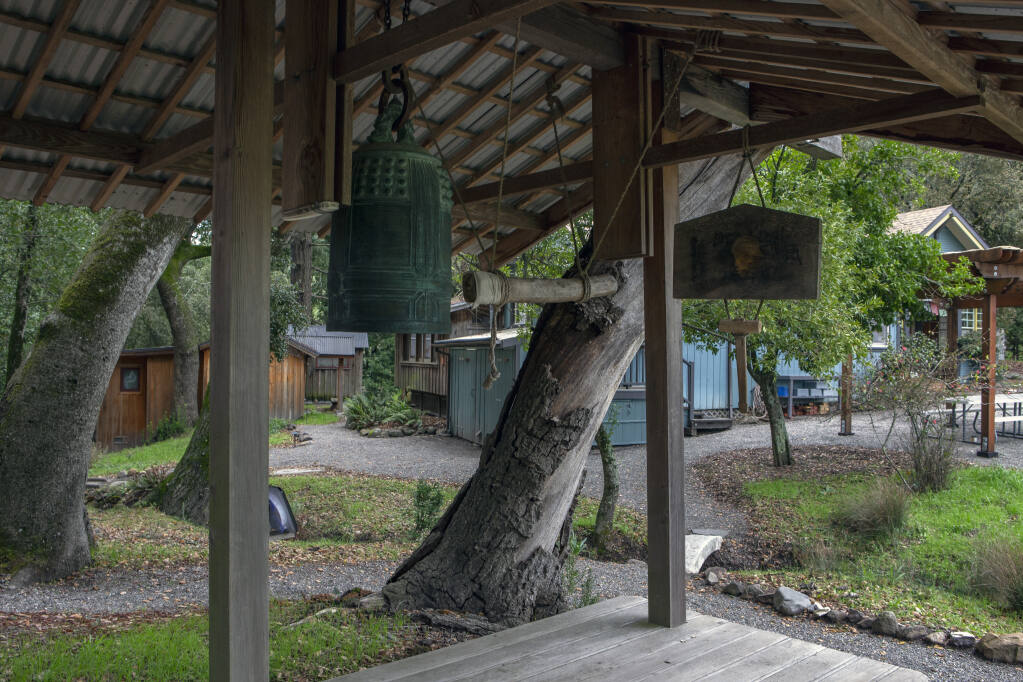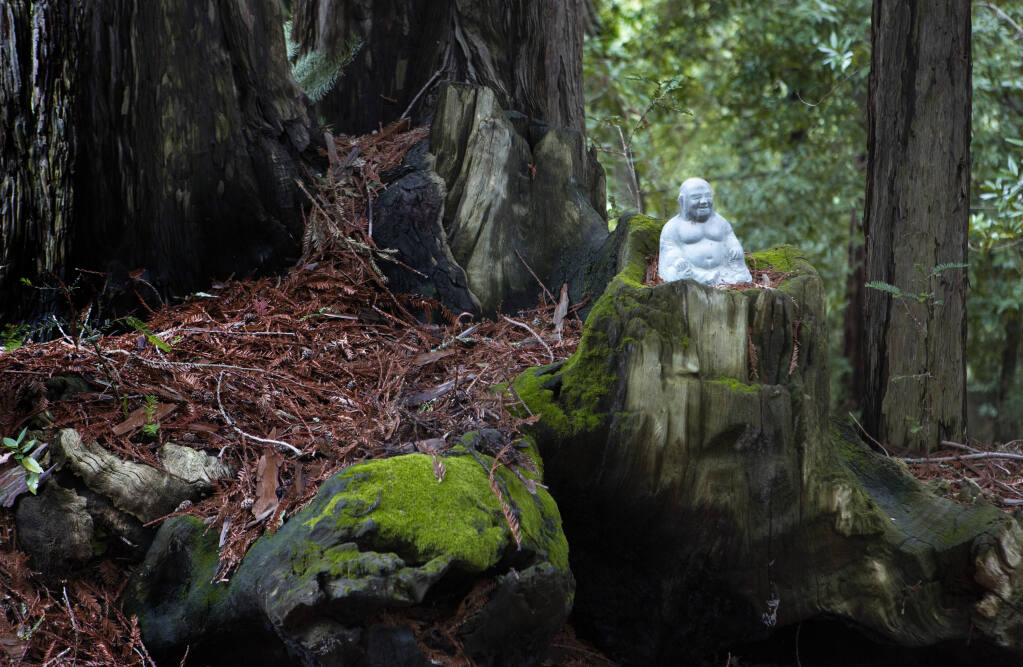Beloved Sonoma Zen leader reflects on his life and teachings
(copy of Sonoma Index-Tribune article)
DANIEL JOHNSON
INDEX-TRIBUNE STAFF WRITER
February 8, 2024
Wearing dirty, black clothing and heavy boots, Bill Kwong wandered into Sokoji, a Zen temple in San Francisco, and soon observed Shunryu Suzuki-roshi, its spiritual leader, slowly and carefully rearranging flowers on an altar.
Kwong, then an inquisitive social activist, thought to himself, “This is really square,” and left. It piqued his curiosity though, and soon afterward he was drawn back to the temple. He became a student of the roshi (an honorific title used for a highly venerated teacher) in 1959 and with time, emerged as one of Suzuki-roshi’s closest and most beloved students.
In the early 1970s, when Suzuki-roshi was dying of liver cancer, he designated Kwong — now known as Jakusho Kwong, the name he had been given by the roshi — as a dharma heir (spiritual successor). Kwong and his wife, Shinko Kwong, went on to establish Sonoma Mountain Zen Center in 1973 and he remained the abbot (head of the temple) there until Sept. 2, 2023, when his son, Nyoze Kwong, succeeded him.
Throughout his teaching, Jakusho Kwong-roshi has emphasized that zazen (sitting meditation) can help to empty our minds and thereby let go of emotional and intellectual discrimination and prejudice. He teaches that this can enable us to realize the interconnectedness of all things and focus on the present in every action each day.
In retrospect, Kwong-roshi realizes that Suzuki-roshi was doing much more than arranging flowers at Sokoji when he first observed him.
“He was rearranging my consciousness,” Kwong-roshi said.
Suzuki-roshi’s action is an example of menmitsu no-kafu, which means “being careful in doing things” and “being very considerate.”
Kwong-roshi said that in the Zen tradition, this pertains to all actions, including the way shoes are placed outside the zendo (meditation hall), clothes are folded, utensils are handled in the kitchen, tools are used in the garden and zazen is practiced, as well as to all interactions with people.
Now 88 years old, Kwong-roshi still lives with his wife just down the road from Sonoma Mountain Zen Center, which sits at the top of the mountain on 80 acres of a secluded oak woodland and redwood forest overlooking the Valley of the Moon.
He finds it “remarkable” that he served as abbot for 50 years.
“If I had been told I would have to remain abbot for even 20 years, I would have been afraid,” Kwong-roshi said.
His connection to Sonoma County dates to his birth. He was born in Santa Rosa and grew up in Palo Alto with four siblings. His parents had moved from Guangdong (formerly known as Canton) province in China to the United States during the 1930s, but did so illegally due to the Chinese Exclusion Act.
During the 1950s, the Kwongs were well aware of the popular distinction between hipsters and squares. They were drawn to the seminal Buddhist writings of D.T. Suzuki and Alan Watts, favorites among the hipsters, and decided to move to San Francisco in pursuit of more radical lives.
Kwong-roshi was enrolled at San Jose State University, intending to become an art teacher, when he was involved in a car accident that nearly killed him. He subsequently began delivering mail for the U.S. Postal Service to strengthen his legs.
He soon married Shinko (then known as Laura) and took a job as a sign painter and window designer for Cost Plus Imports.
The couple was seeking an alternative lifestyle when he came across an article about Suzuki-roshi in a Japanese newspaper.
Suzuki-roshi had arrived in San Francisco on May 23, 1959, to attend to Sokoji, then the only Soto Zen temple in San Francisco. (Soto is the largest of the three traditional sects of Zen in Japanese Buddhism.)
One of Suzuki-roshi’s first students, Kwong-roshi diligently practiced and studied with the venerable teacher for 11 years. In 1971, Suzuki-roshi began the process of dharma transmission with Kwong-roshi, a custom in which a person is established as a successor in an unbroken lineage of teachers and disciples.
Suzuki-roshi died before the transmission was complete, so Kwong-roshi continued the process with Kobun Chino Otogawa, then the head of Haiku Zen Center in Los Altos. Kwong-roshi completed the transmission with Hoitsu Suzuki, Suzuki-roshi’s son and first dharma heir.
Richard Baker-roshi, also one of Suzuki-roshi’s earliest students, already had received his full dharma transmission at the time. Baker-roshi was installed as the abbot of San Francisco Zen Center, but Kwong-roshi, who had been his peer as a “dharma brother,” found he could not relate to him as a teacher.
At Baker-roshi’s suggestion, Sterling Burnell, a wealthy, longtime friend of Suzuki-roshi, offered to rent 81 acres of land on Sonoma Mountain to Kwong-roshi and Shinko for $400 per month, with the understanding that if they liked it, they could make a down payment to purchase it for $70,000.
“He later increased the price to $170,000, but said that for every dollar we paid, he would double it,” Kwong-roshi said. “We were able to pay it off in 10 years.”
The couple immediately loved the tranquil, rural setting. Sonoma Mountain is considered sacred by the area’s Pomo and Miwok Native American tribes.
Kwong-roshi sensed the subtle, mystical quality of the land, especially on cool, damp mornings before the fog lifted.
He taught classes at Sonoma State University and Shinko pursued a career as a psychologist.
In 1973, Kwong-roshi and Shinko decided to establish a Zen community by transforming an old barn into Genjo-ji Temple (translated as “manifesting everyday activity”), more commonly known as Sonoma Mountain Zen Center, in honor of Suzuki-roshi.
The center's handcrafted buildings were constructed from recycled materials taken from old barns in the area.
During the past 50 years, the center has developed into an intimate community with a small residential program. It maintains a small staff and offers a regular daily zazen (sitting meditation) practice for members.
On most Saturdays, it hosts a community program that includes meditation instruction, a meditation period, a dharma talk and a buffet lunch. A $15 fee is charged.
Kwong-roshi has become one of the most prominent Zen practitioners in the United States, with his teachings praised by a wide range of people, from renowned Buddhist teacher Thich Nhat Hanh to basketball legend Phil Jackson. Many of them laud his humility, gentleness and insight, and appreciate that he presents himself as a fellow traveler on a spiritual path rather than as a lofty, omniscient teacher.
He has written two books — "No Beginning, No End: The Intimate Heart of Zen” and “Mind Sky: Zen Teaching on Living and Dying” — that include his own calligraphy, and released an extensive set of audio lectures, “Breath Sweeps Mind.”
Recently, as part of the center’s Sonoma Mandala project, a new residence hall and bathhouse were built, utilities were updated and underground infrastructure was boosted. Still to come are a new mountain gate leading up to the temple and a new meditation hall on the back side of the existing temple.
Kwong-roshi still participates in meditation sittings and activities at the center and is respected as an esteemed teacher, but due to his age, he has had to curtail his sittings.
“I can’t practice a young monk’s schedule now,” he said. “Nearly all our members have become old, too.”
He also no longer is able to travel to Poland and Iceland to offer retreats and workshops at the Zen communities he established there.
The center was evacuated on Oct. 10, 2017, when it was severely threatened by the Tubbs Fire, which burned about one-third of its land. It also was hit hard by COVID-19.
“Hardly anyone was here for three years,” Kwong-roshi said.
He is hopeful that his youngest son, Nyoze, will attract more young people to the center.
“The future of the center is up to him now,” Kwong-roshi said.
He and his wife have three other sons — an architect, an accountant and an artist.
“In the Japanese Zen tradition, the first son is the successor, but Nyoze was our last child: It took us some time to get it right,” he said, smiling. “By the time he arrived, we were more relaxed as parents.”
Nyoze, 54, received a bachelor’s degree in anthropology from the University of California, Santa Cruz. He has more than 30 years of meditation experience and is drawn to socially engaged Buddhism.
Nyoze has trained with well-respected teachers in Japan and United States. In 2015, he was certified and recognized as a Zen teacher in Suzuki-roshi’s lineage. He lives at the center with wife Kashin and son Ejo.
“It is beyond a father’s dream to have him succeed me,” Kwong-roshi said.

1. Jakusho Kwong-roshi, founder and former abbot of Sonoma Mountain Zen Center, in his home near the center on Friday, Jan. 26, 2024. (Robbi Pengelly/Index-Tribune)

2. A corner of the zendo (meditation hall) at Sonoma Mountain Zen Center on Friday, Jan. 26, 2024. (Robbi Pengelly/Index-Tribune)

3. The grounds of Sonoma Mountain Zen Center on Friday, Jan. 26. (Robbi Pengelly/Index-Tribune)

4. A Buddha statue on the grounds of Sonoma Mountain Zen Center on Friday, Jan. 26, 2024. (Robbi Pengelly/Index-Tribune)
Reach the reporter, Dan Johnson, at daniel.johnson@sonomanews.com.